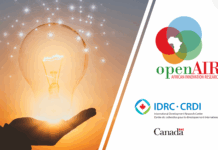By Nagham El Houssamy and Nadine Weheba
This is part two in a three part series. For part one, click here. For part three, click here.
Monumental advances in technology are impacting human lives, including in Africa. Fourth industrial revolution (4IR) technologies, data, and artificial intelligence (AI) feature prominently in initiatives conducted at Open AIR hubs across Africa and in Canada. Open AIR is conducting groundbreaking research related to AI and gender equality, AI’s future impacts on youth employment, and the inclusion of marginalized communities in African AI policy.
Through thematic research on high technology hubs, informal innovation, and indigenous entrepreneurship in Africa, Open AIR is taking steps toward advancing an emerging research agenda on AI for development. With this research, we are tackling questions related to AI and gender equality, AI’s future impacts on youth employment, and the inclusion of marginalized communities in African AI policies.
In part two of this series, we turn to our Eastern African hub, the Center for Intellectual Property and Information Technology (CIPIT) at Strathmore University, Kenya
Partnering for Conscientious AI Policy
AI activities at CIPIT, under the direction of Open AIR’s high tech hubs theme leader and Founding Director of CIPIT, Isaac Rutenberg, encompass events and network building, and CIPIT has been leading the way on research relating to AI.
Strathmore University hosted the Artificial Intelligence for Development (AI4D) conference from 3-5 April 2019, which was organized by the International Development Research Centre (IDRC), the Swedish International Development Cooperation Agency, Knowledge 4 All Foundation, and the UNESCO Chair in Artificial Intelligence. The workshop, entitled “Toward a Network of Excellence in Artificial Intelligence for Development (AI4D) in sub-Saharan Africa”, aimed to identify a research and capacity building roadmap, including devising strategies and possible partnerships as this network is established. More information about the event can be found here.
Rutenberg and CIPIT also participated in the AI for Good Conference in April 2019, which was hosted at Strathmore University in partnership with Access Partnership and Microsoft. During the event, Rutenberg stressed the commitment of Strathmore University to champion AI technologies in Kenya. During the conference, Microsoft also launched its whitepaper, Artificial Intelligence for Africa: An Opportunity for Growth, Development, and Democratization, which addresses the issue of the ethical use of AI.
AI and Africa
In May 2019, Rutenberg then participated in the “#AI4DNetwork Knowledge Webinar: Introducing the 2019 Government AI Readiness Index”. During his talk at the webinar, Rutenberg stressed that the index engages in a “self-selecting exercise”, since it does not account for African countries who seldom publish or update their progress on the Internet. Kenya, for example, was ranked highest in the Index, quite close to Tunisia, but their official websites do not discuss progress in the field. Online data is therefore unreliable for researchers to follow, especially when it comes to Sub-Saharan African countries. Rutenberg highlighted how AI is like any other innovation space, so driving factors or forces of AI will include large companies; that is, AI research comes from major telecoms and international businesses such as IBM and Microsoft.
At the webinar, Rutenberg also brought up an important concept, what he called “second-mover advantage”. This is similar to leap-frogging in that the Global South is presented with the opportunity to learn from the Global North’s mistakes. An example of this is the recent San Francisco ban on the use of facial recognition technology for surveillance purposes by police and government agencies. As for the threat of AI and job losses in Africa, Rutenberg proposed that the Western-centric notion may have minimal effects in Africa. For example, the cost of implementing AI drivers in Sub-Saharan Africa, would be higher than that of simply hiring human drivers, due to normalized low wages in the region. Further, Rutenberg discussed the question of AI and possibilities of exacerbated inequalities. In the webinar, he stated that the determining factor when it comes to this question is data availability, referring to data poverty in Africa. Data poverty refers to the lack of access to data and information. Rutenberg pointed out that AI is “useless if you don’t have large data sets”, and as a result much of the question relies on the availability of the data required to maintain the technology. More information on the webinar is available here.
New Research Coming
A CIPIT Senior Research Fellow, Arthur Gwagwa, is undertaking new research on AI in Africa. Gwagwa is currently conducting research for Open AIR on the law and policy governance structures of AI in South Africa, Kenya, Nigeria, Rwanda and Senegal. Gwagwa has given multiple talks and published several outputs on the topic of AI. He recently discussed “AI and Privacy: Challenges and Ways Forward in the Global South” at RightsCon in Tunis in June 2019. More information on this talk can be found here. Among his relevant publications are the following:
- “Including Youth’s Views in Decision-Making Processes on Artificial Intelligence Design and Policies,” unpublished study, 2018.
- “Minimizing Algorithmic Bias and Discrimination in the Digital Economy,” talk at UNCTAD Africa e-Commerce Week, 2018.
- “Exporting Repression? China’s Artificial Intelligence Push into Africa,” blogpost for Council on Foreign Relations, 2018.
Research at CIPIT on AI will continue, particularly focusing on the ways in which the technology is adopted (or not adopted) by various sectors in Kenya and the region. From manufacturing to government services, AI is touted as having the potential for wide reaching positive impacts. Whether such impacts will be realised is dependent upon many variables, and the AI4D Network will seek to contribute to our understanding of those variables in the coming months.










